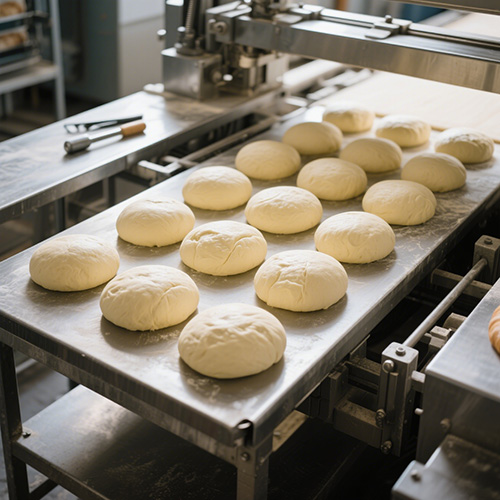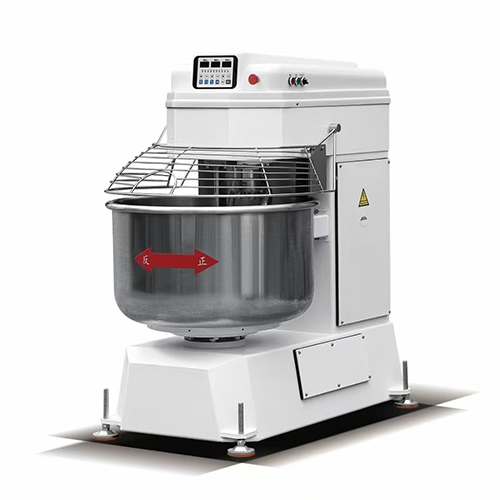



In the commercial baking world, large-scale operations demand equipment that can handle high production volumes without compromising on quality. For bakeries, the industrial kneading machine is essential in ensuring consistent, high-quality dough while improving efficiency. This post explores why an industrial bread kneading machine is crucial for large bakeries and how it can streamline your operations.
For bakeries dealing with large quantities of dough, the traditional method of hand kneading becomes impractical. An industrial bread kneading machine automates the process, handling large batches of dough with consistency and precision. With automation, bakeries can significantly reduce labor costs, increase production output, and meet the growing demand for their products without sacrificing quality.
The consistent performance of industrial kneading machines ensures uniform dough texture, which is crucial for producing high-quality baked goods like bread, pastries, and pizzas. The machine also reduces human error, leading to more reliable results with every batch.
Time is money in a bakery, and the faster you can produce dough, the better. An industrial kneading machine saves valuable time by automating the kneading process, which traditionally takes several minutes per batch. With automation, the machine can knead dough in just a few minutes, allowing bakeries to increase production capacity.
For large bakeries, this time-saving capability means being able to handle larger orders with shorter turnaround times. Additionally, the consistency in dough preparation reduces downtime due to product rework, further improving efficiency across the entire production line.
When choosing an industrial bread kneading machine for your bakery, there are several important features to consider to ensure the machine suits your needs:
Automation is the key to scaling up operations. With an industrial bread kneading machine, the entire kneading process becomes automated, freeing up labor for other tasks in the bakery. Automated machines also ensure greater consistency, as the kneading time, speed, and intensity are all preset to deliver uniform results.
In addition, automation minimizes the risk of human error and allows for more precise control over the dough’s texture. This is particularly beneficial for bakeries looking to maintain high standards across multiple batches of dough, whether for bread, pizza, or other products.
The texture of dough plays a critical role in the quality of baked goods. Over-kneading or under-kneading can result in dough that is either too dense or too sticky. An industrial bread kneading machine ensures that each batch of dough is kneaded to the perfect consistency, which is essential for producing light, airy, and well-textured bread and pastries.
These machines are specifically designed to work the dough without overworking it, leading to the development of the right gluten structure. This results in a dough that is both strong enough to rise properly and soft enough to deliver a tender crumb in the final product.
For pizza makers, consistency in dough is especially important. An industrial kneading machine that specializes in pizza dough will ensure that each batch has the right texture for easy stretching and handling. Whether you’re making thin crusts or deep-dish pizzas, a kneading machine tailored to this application will give you the flexibility you need to produce the perfect dough every time.
Additionally, using an industrial machine for high-volume pizza dough production helps meet the demands of large restaurants or pizzerias that need a reliable, consistent dough source for high customer volumes.
Though the initial cost of an industrial kneading machine can be significant, the long-term benefits far outweigh the expense. The primary advantage is cost reduction in labor. With automation, bakeries can reduce the need for manual labor, resulting in a leaner, more efficient operation.
Additionally, because industrial bread kneading machine improve consistency, bakeries see less dough waste and better overall yields. The faster dough production times also help bakeries take on larger orders, further increasing revenue.
Regular maintenance ensures that your industrial kneading machine operates smoothly and has a long lifespan. Here are a few tips for keeping your machine in top condition:
| Model | Capacity | Dimension | Voltage | Power | Speed (r/min) |
|---|---|---|---|---|---|
| LJ-25 | 25 kg/80 L | 960 × 650 × 1250 mm | 3-phase, 380V | 5 kW | 120/240 |
| LJ-50 | 50 kg/130 L | 1140 × 720 × 1460 mm | 3-phase, 380V | 7 kW | 120/240 |
| LJ-75 | 75 kg/200 L | 1400 × 750 × 1600 mm | 3-phase, 380V | 10 KW | 130/260 |
| LJ-100 | 100 kg/260 L | 1500 × 900 × 1620 mm | 3-phase, 380V | 11 kW | 130/260 |
| LJ-125 | 125 kg/320 L | 1520 × 940 × 1600 mm | 3-phase, 380V | 13.5 kW | 130/260 |
| LJ-150 | 150 kg/380 L | 1640 × 1080 × 1550 mm | 3-phase, 380V | 15.5 kW | 130/260 |
Investing in an industrial kneading machine is one of the best decisions you can make to improve the efficiency and quality of your bakery’s operations. Whether you’re increasing production output, improving dough consistency, or reducing labor costs, these machines are built to meet the needs of large bakeries. With the right equipment, your bakery will be able to scale its operations while maintaining the highest quality standards.
If you’re ready to enhance your bakery’s production process and stay competitive, it’s time to invest in an industrial kneading machine. Contact us today to learn more about how our products can support your business goals!
What types of dough can industrial kneading machines handle?
An industrial bread kneading machine can handle a variety of doughs, including bread dough, pizza dough, pastry dough, and cookie dough, depending on the model.
How long does it take to knead dough with an industrial kneading machine?
On average, industrial bread kneading machine knead dough in 5 to 10 minutes, depending on the type and quantity of dough being processed.
How do I know if my bakery needs an industrial kneading machine?
If your bakery needs to produce large quantities of dough with consistent quality, an industrial bread kneading machine is a worthwhile investment. It saves time, reduces labor, and ensures product uniformity.
Are industrial kneading machines easy to maintain?
Yes, industrial bread kneading machines are designed to be low-maintenance, but they do require regular cleaning and occasional checks on components like motors and belts.

